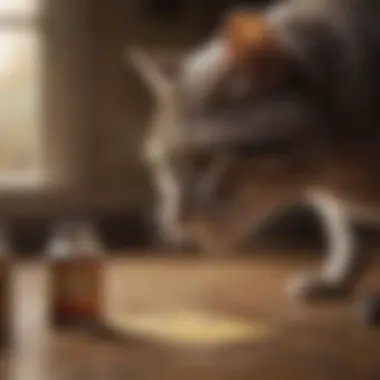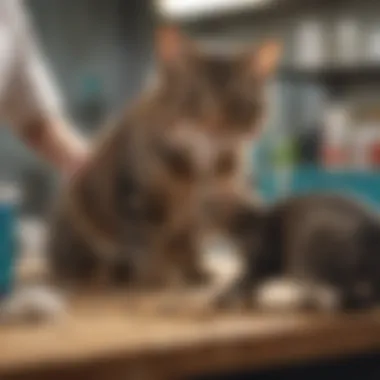Cat Emergency: What to Do If Your Cat Eats Rat Poison


Intro
Encountering a situation where your cat has ingested rat poison can be distressing. As a cat owner, it is crucial to act quickly and efficiently. This guide outlines the necessary steps to take immediately after such an incident. It also discusses the symptoms you should look out for, available treatment options, and how to prevent similar emergencies in the future. By understanding the implications of rat poison on feline health, you can be better prepared to handle this urgent situation.
Understanding Rat Poison
Rat poisons, commonly referred to as rodenticides, come in various types. They function mainly by disrupting the normal physiological processes of rodents. However, these substances can be equally hazardous to your cat. Knowing the specific type of poison your cat may have ingested can sometimes be helpful in assessing the emergency.
Types of Rat Poison
- Anticoagulants: These are the most common types. They prevent blood from clotting, leading to internal bleeding. Examples include bromadiolone and brodifacoum.
- Cholecalciferol: This type increases calcium levels in the body, which can lead to kidney failure.
- Zinc Phosphide: This compound produces phosphine gas in the stomach, which is highly toxic.
Understanding these types is vital in determining how to respond effectively.
Immediate Actions to Take
When you suspect that your cat has consumed rat poison, immediate action is required. Here are the steps you should follow:
- Do Not Induce Vomiting: Not all poisons can be expelled safely this way. Inducing vomiting without professional guidance can cause further harm.
- Contact a Veterinarian: Reach out to your veterinarian or an emergency animal clinic. They have the expertise needed to guide you through the situation.
- Provide Details: Be prepared to share information about the poison, your cat’s size, and any symptoms observed. This will help the veterinarian to assess the situation accurately.
Remember: Time is crucial. Do not delay in seeking professional help.
Symptoms to Monitor
Cats may exhibit a range of symptoms after ingesting rat poison. The following are commonly observed:
- Sudden lethargy or weakness
- Unexplained bruising or bleeding
- Difficulty breathing or coughing
- Vomiting or diarrhea
- Seizures or tremors
It is crucial to keep a vigilant watch on your pet following ingestion. Early detection can lead to better outcomes.
Treatment Options
Depending on the type of poison and the severity of the case, treatment can vary. Below are some common treatment methods employed by veterinarians:
- Activated Charcoal: This may be administered to limit further absorption of the toxin.
- Intravenous Fluids: This is often essential to support kidney function and hydration.
- Medications: Specific antidotes, such as vitamin K for anticoagulant poisoning, may be utilized.
- Surgery: In some cases, surgical intervention is necessary, especially if there is a severe obstruction or internal damage.
Always follow the veterinarian’s advice for treatment and aftercare.
Preventive Measures
Preventing access to rat poison is vital for your pet's safety. Here are some suggestions:
- Secure Storage: Ensure that all rodenticides are stored in locked cabinets, out of reach of pets.
- Use Pet-Friendly Alternatives: Consider using humane traps or non-toxic pest control methods.
- Monitor Your Environment: Check areas where rats may inhabit and ensure there are no accessible poisons.
By implementing these preventive measures, you can significantly reduce the risk of poison ingestion.
Epilogue
Rat poison exposure is a serious matter requiring immediate attention. Familiarizing yourself with the types of poisons, symptoms to watch for, treatment options, and preventive measures can empower you as a pet owner. In the event of exposure, acting swiftly and consulting a veterinarian can safeguard your cat's health. Keep your home safe and remain vigilant in ensuring that toxins are stored securely, thus protecting your beloved feline friend.
Understanding Rat Poison and Its Risks


Understanding the nature of rat poison and its associated risks is essential for any cat owner. When faced with a situation where a pet has ingested rat poison, knowledge of the different products and their effects can significantly affect the outcome. Rat poison often contains anticoagulants, which disrupt blood clotting mechanisms, or other compounds that can lead to varying degrees of toxicity. Each type of rodenticide has unique characteristics and potential consequences for cats. Knowing these specifics can help you make informed decisions in an emergency.
Common Types of Rat Poison
Rat poisons generally fall into several categories. The most common types include anticoagulant rodenticides and non-anticoagulant options.
- Anticoagulants: Such as Bromadiolone and Brodifacoum. These slow-acting poisons cause internal bleeding over days.
- Bromethalin: This neurotoxin affects the brain's ability to regulate fluids, leading to increased pressure.
- Cholecalciferol: A form of vitamin D, it leads to elevated calcium levels, affecting the kidneys and heart.
Each of these substances can impact cats differently, making it vital to identify the specific type involved in any ingestion incident.
How Rat Poison Affects Cats
The way rat poison influences a cat's body depends largely on the type consumed. Anticoagulants prevent the blood from clotting, leading to potentially fatal internal bleeding. Symptoms might not appear immediately, often causing a delay in realizing there is a problem.
In contrast, poisons like Bromethalin cause neurological symptoms, which could manifest as seizures. Cholecalciferol toxicity can lead to symptoms related to kidney failure, presenting much later as well. The specifics surrounding each toxic agent underline the importance of understanding the mechanisms involved.
Signs of Ingestion
Recognizing the signs of rat poison ingestion can be crucial in ensuring timely intervention. Common symptoms to watch for include:
- Lethargy or weakness: An unusual lack of energy.
- Vomiting: While this is common in many poisoning scenarios, the continuous urge to vomit can indicate sickness due to poison.
- Seizures or tremors: Especially in cases of Bromethalin ingestion.
- Unusual behavior: Cats may become agitated or confused.
- Difficulty breathing: This can stem from internal bleeding or swelling.
The prompt recognition of these symptoms may enable a quicker response from caregivers, which is critical in cases involving rat poisoning. Furthermore, veterinary treatment can be more effective when initiated early.
Immediate Actions to Take
Addressing the immediate actions to take when a cat consumes rat poison is a crucial part of ensuring their safety. Understanding these actions can mean the difference between life and death for your pet. A swift response minimizes the risk of serious health complications. Mental clarity and a focused approach in such emergencies is vital.
Identifying the Type of Poison
First, you must determine the type of rat poison your cat may have ingested. There are several variants available, each with different active ingredients. Common types include anticoagulants like brodifacoum and bromadiolone, neurotoxins such as bromethalin, and cholecalciferol. Knowing the specific poison can significantly influence the treatment approach. Check any containers or packaging around to verify the substance. If unsure, you can contact the poison control center or a veterinarian for guidance. The sooner you identify the type, the quicker you can proceed with an appropriate course of action.
Do Not Induce Vomiting
Inducing vomiting is a common misconception in the case of poison ingestion. Doing this might cause more harm than good, especially if the poison is a caustic substance. By trying to forcefully expel the contents of the stomach, there may be a risk of aspiration or further internal injury. Always refrain from inducing vomiting without guidance from a veterinarian. Seek professional advice first, as they will assess the situation and suggest the safest steps to take.
Contacting a Veterinarian
After determining the type of poison, your next step is contacting a veterinarian. This communication is vital, as they possess the experience and knowledge to guide you through this emergency situation. Provide them with detailed information about your cat's condition, including the specific poison if known, the amount ingested, and the time of ingestion. Your veterinarian may also ask for any symptoms your cat is exhibiting. Quick and clear communication will aid in assessing the urgency. Do not delay in seeking professional help, as time may be crucial in such scenarios.
Preparing for the Vet Visit
If instructed to bring your cat in for treatment, preparation is key. Gather any relevant information about the case, including the packaging of the poison, dosage details, and any previous medical history of your cat. It may be beneficial to take notes on any symptoms observed. Bring a secure carrier for your cat to ensure they are transported safely and comfortably. In some cases, the veterinarian could advise specific measures to take before the visit. Following their guidance meticulously helps ensure your pet's prompt treatment upon arrival.
Remember, the sooner you take action, the better the chances of a positive outcome for your cat. Time is an important factor in emergencies.
Recognizing Symptoms of Poisoning
Recognizing symptoms of poisoning in cats is crucial for timely intervention. Understanding how rat poison affects felines can make a decisive difference in outcomes. Knowing the signs helps pet owners act quickly, increasing the chance of a positive recovery. Cats often cannot communicate their distress, making it essential to observe subtle changes in behavior and health.
Common Symptoms to Watch For
Certain symptoms can be indicative of rat poison ingestion. The following are common signs to monitor for:


- Vomiting: This can occur soon after ingestion, although not always is present.
- Diarrhea: Loose stools may develop, sometimes with blood.
- Lethargy: A noticeable decrease in energy levels can be alarming.
- Loss of Appetite: Refusal to eat is an important behavioral change to note.
- Difficulty Breathing: Respiratory distress may signal serious complications.
- Tremors or Seizures: Neurological symptoms can indicate severe toxicity.
- Bleeding: Spontaneous bleeding from the gums or nose is particularly concerning.
These symptoms can range from mild to severe and should be taken seriously.
Severe Symptoms Indicating Immediate Care
While some symptoms may seem mild, others represent serious conditions requiring immediate veterinary care. Immediate intervention can be life-saving. Watch for these severe signs:
- Severe Bleeding: This may include excessive bruising or bleeding that does not stop.
- Unconsciousness: A state of unresponsiveness demands urgent attention.
- Severe Respiratory Distress: This may present as gasping or open-mouth breathing.
- Persistent Seizures: Frequent or prolonged seizures are extremely critical.
- Sudden Behavioral Changes: Sudden aggression or confusion can indicate distress.
Taking note of severe symptoms can lead to quicker veterinary response and better outcomes for your cat.
Each observed symptom can provide valuable information to your veterinarian, helping them determine the best course of action.
Veterinary Diagnosis and Treatment
The topic of veterinary diagnosis and treatment holds a critical place in the protocol for handling a situation where a cat has ingested rat poison. Understanding what goes on during the veterinary assessment can significantly influence the outcome for the cat. Quick action can mean the difference between life and death.
As cat owners, being proactive in these moments is essential. The initial consultation often involves detailed questioning regarding the timing and specifics of the incident. Providing this information helps veterinarians choose the most appropriate diagnostic approach and treatment.
Diagnostic Procedures
Diagnostic procedures are an essential part of the veterinary treatment process. When a cat is suspected of having consumed rat poison, the veterinarian will typically start with a thorough physical examination. This examination might include:
- Checking vital signs: temperature, heart rate, and respiratory rate.
- Observing for any physical signs of distress such as lethargy or unusual behavior.
- Asking the owner for details about the type of poison, dosage, and when ingestion occurred.
Blood tests may also be conducted to assess liver and kidney function, as rat poison often affects these organs. Additionally, X-rays may be necessary if there is a concern about foreign bodies or internal damage. The timely implementation of these diagnostic steps allows for a swift identification of the poison's effects, which is crucial for subsequent treatment decisions.
Treatment Options Available
Once the diagnosis is made, treatment options will vary depending on the type of poison ingested and the severity of the symptoms. Common treatments for rat poison ingestion include:
- Activated Charcoal: If ingestion occurred recently, activated charcoal may be administered to absorb the toxins in the gastrointestinal tract.
- IV Fluids: IV fluids can help maintain hydration, especially if the cat is showing signs of weakness or lethargy.
- Vitamin K: This is commonly given in cases where anticoagulant (blood thinner) poisons are involved. It helps restore the cat's ability to clot blood.
- Antidotes: Depending on the specific poison, an antidote may be available and can be administered by the veterinarian.
It is crucial for owners to follow the vet’s instructions closely during this phase, as the efficacy of treatment can depend heavily on adherence to dosage and timing.
Monitoring Recovery
Monitoring recovery is just as important as the initial treatment. After the cat has been treated, veterinarians often recommend follow-up visits. These visits may include:
- Evaluating blood work results to check for any lingering effects of the poison.
- Keeping an eye on the cat’s behavior and physical condition to identify any late-emerging symptoms.
- Scheduling additional treatments if necessary, depending on recovery progress.
Owners should also maintain a log of their pet's behaviors, such as eating, drinking, and activity levels. This information can provide valuable insight for the veterinarian during follow-ups. While many cats can recover well from rat poison ingestion, close observation and a robust recovery plan are vital for ensuring long-term health.
It is important to remember that the faster you act when a cat consumes rat poison, the better the chances for a successful recovery.
Preventing Future Incidents
Preventing incidents where cats consume rat poison is paramount for ensuring pet safety. Understanding this topic is crucial not only for responsible pet ownership but also for enhancing overall awareness about household dangers. By implementing effective strategies, cat owners can minimize the risks associated with rodent control measures. The following sections provide insights into safe practices, home environment adjustments, and alternative methods for rodent control.
Safe Use of Rodenticides
Using rodenticides safely means taking necessary precautions. It is essential to read labels carefully. Most products come with specific instructions regarding placement, dosage, and safety measures. Follow these guidelines to avoid unintentional exposure to pets.


- Choose pet-safe options: Many manufacturers offer formulations designed to be less harmful to pets. Look for products that mention safety for cats or are labeled as “natural.”
- Secure placement: Always place poisons in areas inaccessible to pets, such as within locked traps or high shelves. This adds a layer of safety.
- Monitor usage: Regular checks on affected areas are crucial. Remove any dead rodents to prevent any second exposure to poisons through the food chain.
By adhering to these guidelines, pet owners can greatly reduce the likelihood of accidental ingestion in the future.
Creating a Pet-Safe Home Environment
Designing an environment that prioritizes pet safety requires intention and effort. Start by identifying potential dangers in your home and addressing them accordingly.
- Closely assess all rooms: Look for areas where rat poison or similar hazardous materials may be stored. Keep such products in high or locked cabinets.
- Utilize barriers: Close off areas where rodents might enter. Seal cracks and holes in walls and foundation to limit pest entry.
- Educate household members: Ensure everyone in the household understands the risks associated with rodenticides. They should know to store these materials responsibly.
Creating a home environment that is mindful of a cat’s safety helps prevent exposure to harmful substances significantly.
Alternate Rodent Control Methods
Considering alternative methods of rodent control can be beneficial for households with pets. There are many options that do not rely on toxic substances.
- Traps: Use snap traps or humane live traps that humans can check regularly. This way, exposure to poison is eliminated.
- Natural deterrents: Ingredients such as peppermint oil can deter rodents without risking harm to a cat’s health. Many plants naturally repel pests.
- Professional services: Sometimes, consulting pest control experts can yield safe and effective methods of rodent removal.
By integrating these alternative strategies into pest management, cat owners can ensure their furry friends remain safe from toxic exposures.
Long-Term Health Considerations
Addressing the long-term health considerations after a cat consumes rat poison is a crucial aspect of responsible pet ownership. Understanding these considerations helps ensure that pet owners remain vigilant about their cat's health well beyond the immediate incident. Cat owners must know that the exposure to rat poison can have subtle yet significant repercussions. Identifying these effects earlier can lead to better outcomes for the feline. It also fosters a sense of proactive care which is essential for the long-term well-being of pets.
Potential Long-Term Effects of Poison Exposure
The ingestion of rat poison may lead to various long-term health issues that can affect your cat's life quality. Here are some specific effects to be aware of:
- Kidney Damage: Certain rat poisons, especially anticoagulants, can impair kidney function over time. Cats with compromised kidneys may experience chronic symptoms, leading to a need for ongoing medical management.
- Liver Dysfunction: Poisoning can cause stress on the liver, potentially resulting in long-term liver disease. Monitoring liver enzymes and functions in follow-up veterinary check-ups can be useful.
- Neurological Issues: Some rat poisons may cause neurological symptoms. These symptoms could manifest as behavioral changes, coordination issues, or lethargy.
- Weight Loss or Changes in Appetite: Long-term effects may interfere with a cat's eating habits, leading to unexpected weight loss or gain. A gradual change in weight trends can indicate underlying health problems linked to previous poisoning.
Recognizing these potential long-term effects early on is crucial for effective intervention and management. Early detection can significantly raise the chances of mitigating serious health issues down the line.
Regular Veterinary Check-Ups
Regular veterinary check-ups play a vital role in monitoring the health of a cat that has been exposed to rat poison. Consistent health evaluations allow veterinarians to assess the ongoing effects of the poison on the cat's body. These check-ups can serve multiple purposes:
- Routine Blood Tests: Testing for organ function, especially liver and kidney, helps identify any abnormalities associated with past poison exposure early on.
- Behavioral Assessments: A veterinarian can evaluate behavioral changes that may result from past poisoning incidents, allowing for adjustments in care.
- Preventative Care: These visits help identify other potential health risks and allow for interventions to keep the cat healthy, thereby enhancing long-term quality of life.
The importance of regular veterinary visits cannot be understated, especially in a scenario where your cat has ingested rat poison. Going beyond emergency treatment, establishing a pattern of medical care aids in maintaining your cat's overall health and fortifies its resilience against future threats.
Resources for Pet Owners
Understanding the resources available for pet owners is vital when it comes to situations of emergency, such as a cat ingesting rat poison. This segment provides information on how to access immediate help and acquire knowledge about pet safety. In critical scenarios, having quick access to emergency contacts can save lives. Moreover, educational resources play a crucial role in empowering pet owners with insights on prevention and management of pet-related health issues.
Emergency Contact Numbers
Keeping a list of emergency contact numbers is essential for any cat owner. During an emergency, knowing whom to call can make all the difference. Here are some key contacts to keep handy:
- Local Veterinarian: Always have your vet's number stored. They can provide critical advice and guidance.
- Emergency Animal Clinic: These clinics are equipped for after-hours emergencies. Make sure to find one nearby.
- Poison Control Hotline: The ASPCA Animal Poison Control Center offers assistance. Their number is (888) 426-4435. They can guide you through the steps to take based on the type of poison consumed.
- Animal Control: In some cases, contacting animal control can be necessary, especially if you suspect continued exposure to poisons in your environment.
Being prepared to reach these contacts can reduce panic during emergencies.
Educational Resources on Pet Safety
Knowledge is a powerful tool for pet owners. Several resources provide valuable education on keeping pets safe from various hazards, including rodenticides. Here are some suggested educational avenues:
- Online Articles and Guides: Websites like Wikipedia and Britannica offer comprehensive articles on pet safety practices.
- Veterinary Websites: Many veterinary offices maintain informational blogs. These posts often cover emergent issues and preventative measures regarding common threats to pets.
- Support Groups on Social Media: Platforms such as Reddit or Facebook host various groups and forums where pet owners share experiences and advice.
- Workshops and Seminars: Many veterinary clinics and pet organizations conduct workshops that educate owners on pet safety and health, providing both theoretical knowledge and practical tips.
Utilizing these educational resources equips pet owners to make informed decisions, fostering a proactive approach to pet health and safety.







